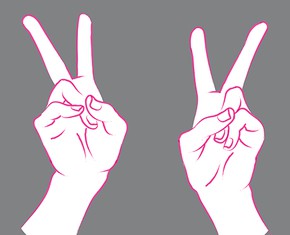The views expressed in our content reflect individual perspectives and do not represent the authoritative views of the Baha'i Faith.
Opinions, the old saying goes, are like navels—everybody has one. So how can we best reconcile the millions of diverse human opinions? What brings us to agreement?
From a Baha’i perspective, the independent investigation of the truth serves as the optimal foundation for effective consultation among people.
Rather than relying on tradition or dogma, the Baha’i teachings say, we each need to search for ourselves, and independently decide on what is true.
For that reason and many others, the Baha’i faith is not a passive belief system—in fact, Baha’is actively participate not only in independent investigation, but also in consultation with each other and with their wider communities. The founder of the Baha’i Faith, Baha’u’llah, advised the Baha’is that:
In all things it is necessary to consult. This matter should be forcibly stressed by thee, so that consultation may be observed by all. The intent of what hath been revealed from the Pen of the Most High is that consultation may be fully carried out among the friends, inasmuch as it is and will always be a cause of awareness and of awakening and a source of good and well being. -Baha’u’llah, from a tablet translated from the Persian.
No man can attain his true station except through his justice. No power can exist except through unity. No welfare and no well-being can be attained except through consultation. – Baha’u’llah, from a tablet translated from the Arabic.
Independent investigation and consultation are interdependent. The varying results of our investigations are what enable us to contribute positively in consultation.
As an example, let’s revisit the familiar story of the six blind men and the elephant. In this tale, six blind men come upon an elephant for the first time. They each examine the elephant. One man says the elephant is like a hose, having touched the trunk. One says the elephant is like a fan, having touched the ear. Each man examines a different part of the elephant and through their investigations they all come to very different conclusions. Every man is right, and every man is wrong. Only when they combine their findings can they form a more complete version of the truth. In the Rig Veda, Krishna said “Reality is one, though wise men speak of it variously.”
This accords with contemporary scientific understanding as it regards determining what is true and what is false:
We have to remember that we observe is not nature in itself, but the nature exposed to our method of questioning. – Werner Heisenberg, Physics and Philosophy: the Revolution in Modern Science, Harpers, February 1958, p. 58.
So let’s imagine that the six blind men examining the elephant are Baha’is, and have the old story continue with them coming together to consult about the animal’s reality. They understand that while each must receive the experiences of the others fairly and equitably, without belittlement or estrangement, it is equally vital that each:
… proceed with the utmost devotion, courtesy, dignity, care and moderation to express their views. They must in every matter search out the truth and not insist upon their own opinion, for stubbornness and persistence in one’s views will lead ultimately to discord and wrangling and the truth will remain hidden. The honoured members must with all freedom express their own thoughts, and it is in no wise permissible for one to belittle the thought of another, nay, he must with moderation set forth the truth, and should differences of opinion arise a majority of voices must prevail, and all must obey and submit to the majority. – Abdu’l-Baha, Selections from the Writings of Abdu’l-Baha, p. 88.
After a consultation where each man thoroughly describes the results of his investigation and attentively listens to the results of the others, where each teaches one piece of the elephant and learns five, the group has a much greater knowledge of the reality of the elephant. The greater the number of opinions of those who entered into consultation, the greater the resulting knowledge would even more closely approach the reality of the elephant.
Humans cannot fully comprehend the reality of an elephant, much less fully comprehend God. Each of us does, however, offer our unique glimpses and viewpoints. The more we share those insights, and the more we value the glimpses that seem different than our own, the closer our consultations on every level will approach reality and approximate the truth. That’s the wisdom of Baha’i consultation:
The purpose of consultation is to show that the views of several individuals are assuredly preferable to one man, even as the power of a number of men is of course greater than the power of one man. Thus consultation is acceptable in the presence of the Almighty, and hath been enjoined upon the believers, so that they may confer upon ordinary and personal matters, as well as on affairs which are general in nature and universal. “For instance, when a man hath a project to accomplish, should he consult with some of his brethren, that which is agreeable will of course be investigated and unveiled to his eyes, and the truth will be disclosed. Likewise on a higher level, should the people of a village consult one another about their affairs, the right solution will certainly be revealed. In like manner, the members of each profession, such as in industry, should consult, and those in commerce should similarly consult on business affairs. In short, consultation is desirable and acceptable in all things and on all issues.” – Abdu’l-Baha, quoted and prefaced by Shoghi Effendi in his letter to the Baha’is of Persia, February 15, 1922.
The Baha’i teachings recommend consultation as an essential element in achieving unity and harmony—and recognize independent investigation as the primary prerequisite for consultation. Only through the sharing of our varying experiences and interpretations can a more complete grasp of reality emerge. When we investigate reality with a curious, loving spirit, seek to understand it, and share our results with others, we use the divine gift of our intellect to advance human unity.
In the next and final article in this short series, we’ll look at how learning the processes of science can help develop the investigative skills that independently determine the truth.
















Comments
Sign in or create an account
Continue with Googleor